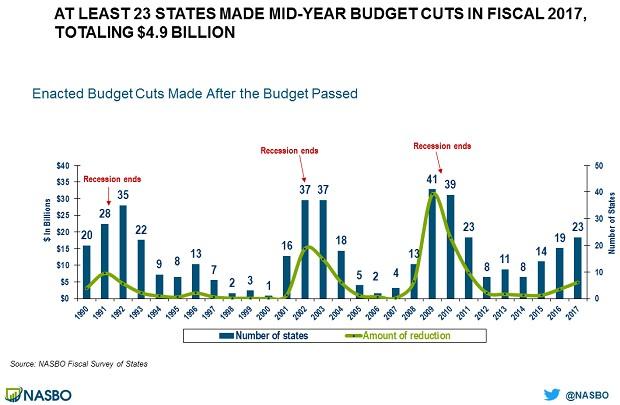Numerous states are tightening their belts as tax revenues come in lower than expected.
A new survey by the National Association of State Budget Officers released on Thursday shows that state general fund spending likely will increase by only one percent in fiscal 2018 from current levels – the smallest spending increase sought by governors since the depths of the Great Recession in 2010.
Related: Could Illinois Be the First State to Go Bankrupt?
For a host of reasons, revenue from state sales taxes, personal and corporate income taxes and other fees are coming in this year below original projections in 33 states, while the other 17 states have reported revenues at or slightly above original forecasts. This lackluster performance caught many state officials by surprise and forced governors and lawmakers in 23 states to make mid-year budget cuts totaling $4.9 billion.
Worried that the revenue shortfalls will persist, governors across the country have recommended extremely modest spending increases for the coming fiscal year, totaling only $8.7 billion across all programs. That’s roughly one percent of the $828 billion of general fund spending projected for fiscal 2018.
Most of that increase will likely go for improvements in kindergarten through 12th grade public education and rising Medicaid health care costs. That leaves little for other pressing problems, including underfunded public employee pension funds, transportation, higher education and other government services.
“We’re seeing really tight budgets,” John Hicks, NASBO’s executive director, said in an interview today. “The report hits on really subdued state tax revenue growth … that has forced states to make mid-course corrections in the budgets they’re currently implementing or getting ready to finish for fiscal 2017.”
Related: States Face a $1 Trillion Pension Crisis - Here Are the Worst 10
State revenues have grown about 4 percent annually since the Great Recession, and NASBO is projecting 2.4 percent growth at the most this year and 3 percent next year.
As for the projected 1 percent growth in general fund spending in the 2018 fiscal year that begins July 1 in most states, Hicks said “That’s a number we don’t typically see that low, particularly outside of a recessionary period.”
“What’s surprising to most folks is that we’re in the eighth year of an economic recovery, the unemployment rate is low, job growth is continuing,” Hicks added. “There are some positive underlying economic conditions, but they’re not translating very well into state revenue coffers – particularly in the sales tax.”
State revenue from sales taxes, personal and corporate income taxes and other fees are coming in below original projections in three-fifths of the states. Sales tax collections – which are usually considered one of the most stable sources of revenue -- are estimated to total $6.6 billion this year, 2.5 percent below previous expectations.
Personal income tax collections are currently $2.7 billion, or 0.8 percent below forecast, while corporate income tax collections are $2.8 billion or 5.7 percent below previous projections.
Related: Nearly a Dozen States Are Suffering From ‘Chronic Budget Stress’
Arkansas, Missouri, New York, Oklahoma and Illinois -- which is facing one of the bleakest budget and fiscal situations of any state in the country -- have all experienced unexpectedly low levels of business tax revenue, according to the report.
Governors have proposed a total of $3.7 billion of tax and fee increases for the coming year to respond to the revenue shortfall, but those are relatively modest compared with the overall challenge.
Hicks and other budget experts and economists blame a number of factors for the states’ revenue shortfalls, including sluggish economic growth, falling gasoline and energy prices, and the growing shift from bricks and mortar retailers to on-line businesses that are evading sales taxes. A flattening of retail prices many have also adversely impacted sales tax revenues.
Some experts also speculate that with a major federal tax cut in the offing this year, wealthier Americans hoping for lower rates are postponing the payment of taxes by deferring or sheltering new income or bonuses.
Related: Senate Republicans Are Getting Closer to Rolling Back Medicaid Expansion
The big unanswered question for state and local officials is whether President Trump and the Republican-controlled Congress will make good on their campaign pledges to repeal and replace the Affordable Care Act -- including making cuts to Medicaid – and overhauling the federal tax code for the first time since 1986.
While the prospect of passage of either of those initiatives is very much up in the air, states could face enormous increases in costs down the road if Congress votes to shift more of the cost and operation of Medicaid to the states or eliminates provisions of the federal tax code that benefit state governments.
State officials are also nervous about Trump’s proposals for tens of billions of dollars in cuts in domestic and social-safety net programs that would impact many of their residents. “States are facing … unprecedented uncertainty at the federal level,” the NASBO report warned.






